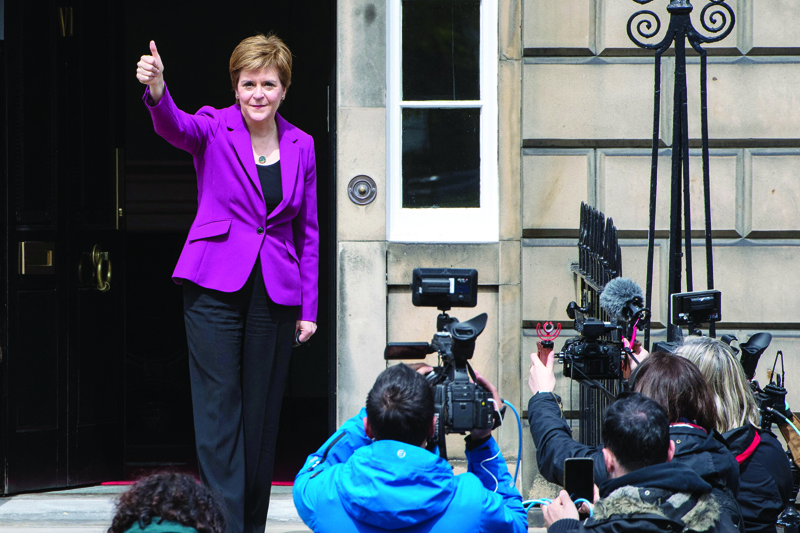 EDINBURGH: Scotland's First Minister and leader of the Scottish National Party (SNP), Nicola Sturgeon gives a thumbs-up on the steps of her official residence Bute House in Edinburgh yesterday following the party's landslide victory in the Scottish parliament elections. - AFP
EDINBURGH: Scotland's First Minister and leader of the Scottish National Party (SNP), Nicola Sturgeon gives a thumbs-up on the steps of her official residence Bute House in Edinburgh yesterday following the party's landslide victory in the Scottish parliament elections. - AFP
LONDON: The Scottish National Party yesterday said its landslide victory in Edinburgh's devolved parliament was grounds for a fresh independence referendum, despite opposition from London. While the SNP campaigned on promises to hold a new vote, the UK government-which would need to give formal legal permission-is opposed, raising fears of a protracted political and legal battle.
Now the nationalists say their slightly increased share of seats, one short of an overall majority of 65, gives them a mandate for "indyref2", so called after the "no" vote in Scotland's first independence vote in 2014. Scottish media stressed the SNP's strong showing, with The Herald on Sunday headlining its front page simply with the word "Landslide". But UK-wide newspapers had a different take, as The Sunday Telegraph declared "Sturgeon falls short of majority". SNP leader Nicola Sturgeon said in her victory speech that Westminster now has "no democratic justification" to deny a second independence referendum.
"I hope to lead Scotland to independence," she told the BBC yesterday. She said that it would be "absurd and completely outrageous" for the referendum to lead to a legal wrangle in the Supreme Court, as could happen if Westminster blocked it and the Scottish parliament passed its own legislation. Prime Minister Boris Johnson has said the 2014 referendum where 55 percent voted "no" should be a once in a generation event.
'Wouldn't play well'
Johnson said Saturday that the SNP's aim of a second referendum was "irresponsible and reckless" while he wrote a public letter to Sturgeon asking her to "work together" in "Team UK." Sturgeon told the BBC that she thought the UK government ultimately would not stand against the referendum because this would come across as disrespectful of Scots' democratic rights.
"It would mean that the Conservative government had refused to respect the democratic wishes of the Scottish people," she said. "I think it is an understatement to say that that wouldn't play well." Yesterday, senior UK minister Michael Gove sought to downplay the brewing conflict.
He insisted in comments to the BBC that for all UK leaders including Sturgeon the priority is recovery from the coronavirus pandemic and claimed the country did not have time now for a "protracted conversation about the Constitution". Gove also argued that the fact that the SNP do not have an outright majority in the devolved parliament-as they did before the first referendum in 2014 -- made a "significant difference".
Meanwhile, Britain's main opposition Labour Party was split over future strategy and embroiled in political infighting on Sunday after suffering huge losses in local polls. Keir Starmer, Labour's leader since 2020, sacked the chair of the party Angela Rayner on Saturday evening after saying he was "bitterly disappointed" by the results. Starmer was reportedly set to launch a reshuffle of his shadow cabinet, while speculation mounted over his own future as leader.
The Times wrote that Starmer's reshuffle "could begin as early as Monday". Supporters of previous leader Jeremy Corbyn led criticism of Starmer, with Corbyn's close ally, Labour MP Diane Abbott, telling Sky News it was "in many ways a disappointing result". "I think sacking Angela Rayner was not a forward-thinking thing to do," she added.
John McDonnell, former Shadow Chancellor under Corbyn, in a BBC interview accused Starmer of failing to create attractive policies. "You can't send candidates into the field like that naked, without any policy," he said. Under hard-left Corbyn, Labour was damaged by accusations of anti-semitism and had a disastrous general election showing in 2019.
Starmer, formerly a human rights lawyer and public director of prosecutions, was elected leader in April 2020, promising to "re-connect" with voters. "On last week's showing, he has spectacularly failed", The Times said. However Ian Stewart, Shadow Secretary for Scotland, told Sky News that Starmer "needs time" to turn the situation around.
"We've got to have a positive policy platform and that's what Keir Starmer is determined to do," he said. Labour performed poorly in Thursday's council elections in England and lost to the Tories in a key by-election in Hartlepool in northeastern England, a Labour heartland since the 1970s. In Scotland, Labour dropped two seats in the devolved parliament under new leader Anas Sarwar, who took over in February. It counted successes in Wales, holding onto power in the devolved parliament and in several mayoral races including London, where Sadiq Khan won a second term.
Andy Burnham, who easily won re-election as a popular mayor of Greater Manchester in northern England appeared to issue a veiled challenge to Starmer's leadership, telling Sky News: "If the party were ever to feel they needed me, I'm here". The results in England appeared to be a vote of confidence in Johnson's leadership post-Brexit and the UK's successful vaccine rollout, despite the country's death toll remaining the highest in Europe. - AFP




